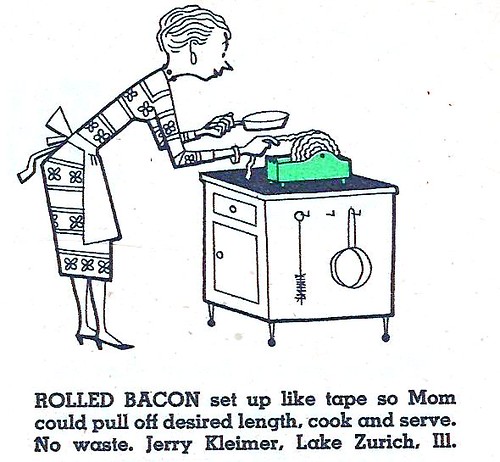
Pages
28 April, 2009
We've Always Been A Little Crazy For Bacon

26 April, 2009
Mountain Dew vs. Mountain Dew Throwback
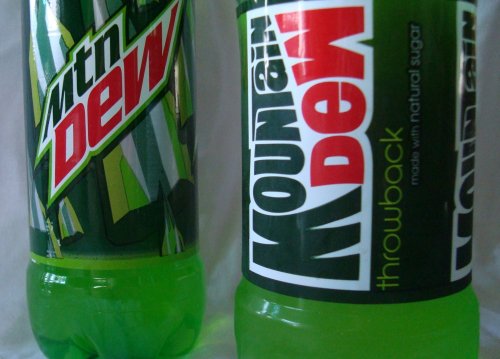 Back in February, I noted that Pepsico was planning on bringing back real sugar-sweetened soft drinks. Pepsi Cola Throwback and Mountain Dew Throwback are now on the shelves as promised.
Back in February, I noted that Pepsico was planning on bringing back real sugar-sweetened soft drinks. Pepsi Cola Throwback and Mountain Dew Throwback are now on the shelves as promised.Although I haven't seen them in the local grocery stores yet, 20-ounce bottles of Mountain Dew Throwback and Pepsi Throwback are being carried by a few convenience stores in my area. I bought a bottle of the Mountain Dew variety today to compare with standard Mtn Dew.
A check of the label reveals that there are two differences between the Dew varieties: Today's "Mtn Dew" (as Pepsico now refers to the drink) contains high-fructose corn syrup and concentrated orange juice; Mountain Dew Throwback is sweetened with sugar, and contains no juice. So, how do they stack up?
No matter what anyone tells you, there is a distinct and noticeable difference in the flavor of drinks sweetened with HFCS and those sweetened with sugar. I was amazed when I took a swig of Mountain Dew Throwback - it tasted exactly like I remembered it tasting when I was back in high school. Although still kind of syrupy sweet (some things never change, I guess) Dew's lemony edge was back. The flavor was sharp and clean.
Mtn Dew, in contrast, tasted thick and rounded, like the flavor had been filed off at the corners. The concentrated orange juice was indetectable - I never knew it was in there to begin with, until I read the labels after comparing the two drinks - but the citrusy tang was just not there.
I poured some in a blind tasting for my daughter. She's 20, born after the big soft drink companies switched over to HFCS, and although Dew is her soft drink of choice (especially the blue Voltage variety) she had never before tasted sugar-sweetened Mountain Dew. She carefully tasted both of the drinks, not knowing which one was which, before she pushed one of the glasses toward me. "That one's fresher tasting. A lot more like citrus. I like it a lot better than the other one." She had chosen Mountain Dew Throwback.
I know that politically-motivated high sugar prices and intense lobbying by Big Corn is going to keep HFCS flowing thickly into soft drinks for a long time. The Throwback products are just a tiny slice of PepsicCo's beverage production, but I am grateful to PepsiCo for at least giving consumers the ability to choose sugar sweetening.
25 April, 2009
Bacon Gumballs
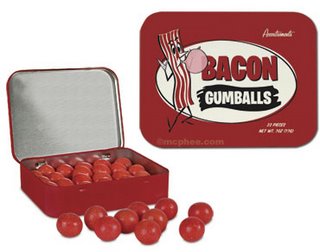 Bacon Gumballs are a product of Archie McPhee/Accoutrements Inc. and there is no doubt in my mind that the folks at McPhee dreamed them up as a gag gift. They taste like cigarette butts and sugar - absolutely vomitous - and it astounds me that so many bloggers have treated them as an actual, viable confection.
Bacon Gumballs are a product of Archie McPhee/Accoutrements Inc. and there is no doubt in my mind that the folks at McPhee dreamed them up as a gag gift. They taste like cigarette butts and sugar - absolutely vomitous - and it astounds me that so many bloggers have treated them as an actual, viable confection.In fact, the more of these "bacon flavored" novelty foods that I sample, the more I discover that none of them are worth a dead rat's ass.
Bacon mints? Smell like smoke, taste like Alka-Seltzer without the fizz. Bacon Salt? Mediocre smoke-flavored salt loaded with artificial flavors that manages, with the help of marketing and imagination, to taste vaguely bacon-ish. Baconnaise? If your idea of "bacon" is liquid smoke and artificial flavorings, then yes, Baconnaise tastes like bacon too.
Thanks to the Internet Bacon Meme, however, I'm quite certain we're going to be plagued by crap like this for years to come. So, in order to be prepared, I'm just going to write this bit of boilerplate and paste it into future reviews of bacon-flavored junk :
Bacon - real cured-and-smoked-pigmeat bacon - is a delicious food and a tasty ingredient that can add marvelous dimensions of flavor and texture to all sorts of other foods and dishes. "Bacon flavored" foods - however well-intentioned - are generally pretty disgusting, and this is no exception.There. That should do it.
23 April, 2009
Microwave vs. Oven: Frozen Pizza
Recently, though, some companies have introduced recipe changes in their manufactured prepared foods that have made products better suited for microwaves. Pot pies, for example. I used to hate pot pies cooked in the microwave because the crusts came out so badly. But recently, Banquet and Marie Callendar pot pies seem to have tweaked the way their crusts are made - I honestly couldn't tell the difference between a microwaved and a baked pot pie the last time I had them.
 And that got me to thinking about frozen pizzas. When I was a kid, frozen pizzas were the bottom of the frozen-food barrel. Nasty in all ways - the crusts were flavorless cardboard, the sauce was cheap, acidic, and rarely seasoned with anything but too much oregano, and the cheese was like plastic. Nowadays, though, there are some really decent frozen pizzas out there. Just about all of them are better when cooked in a conventional oven, though.
And that got me to thinking about frozen pizzas. When I was a kid, frozen pizzas were the bottom of the frozen-food barrel. Nasty in all ways - the crusts were flavorless cardboard, the sauce was cheap, acidic, and rarely seasoned with anything but too much oregano, and the cheese was like plastic. Nowadays, though, there are some really decent frozen pizzas out there. Just about all of them are better when cooked in a conventional oven, though.The first time I ever tried heating frozen pizza in a microwave, it was a Celeste Pizza For One. Even given the generally low quality of Celeste pies to begin with, it was horrible. The cheese was hard and brownish-yellow, the crust leathery and unchewable, and enough of the moisture had evaporated from the sauce to render it into a kind of tangy red tar. Microwaves were just getting wide acceptance then, and food companies were starting to adapt their products to this new way of ruining dinner.
This week, with Celeste Pizzas For One selling for a dollar each at the local Stop & Shop, I picked up a couple of them and decided to do a head-to-head comparison of cheap frozen pizzas cooked in the microwave and in a conventional oven. I picked the Pepperoni variety and followed the package directions to the letter.
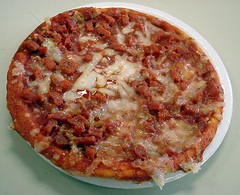 Microwave Instructions: Remove frozen pizza and microwave disk from carton; unwrap. For best results, do not add additional toppings. Cetner disk, silver side up, on microwave-save plate. Place frozen pizza on disk. Place plate in microwave oven. Microwave on HIGH (100%) power 3½ to 4½ minutes, or until most of the cheese is melted, rotating ¼ turn after 2 minutes. Carefully remove pizza from oven. Loosen pizza from disk with spatula.
Microwave Instructions: Remove frozen pizza and microwave disk from carton; unwrap. For best results, do not add additional toppings. Cetner disk, silver side up, on microwave-save plate. Place frozen pizza on disk. Place plate in microwave oven. Microwave on HIGH (100%) power 3½ to 4½ minutes, or until most of the cheese is melted, rotating ¼ turn after 2 minutes. Carefully remove pizza from oven. Loosen pizza from disk with spatula.Result: The package instructions were clear and easy to follow, and did produce a somewhat evenly-heated and acceptable pizza. The cheese melted well but also tended to dehydrate a bit, leaving it translucent and stiff. And because the microwave made the sauce bubble up from the crust, the already-stingy application of cheese looked even less generous as it became hidden beneath a layer of bubble-pocked redness.
The microwave disk definitely helped make the crust crispy, and it was far better than that first one years ago, but it's clear they have a long way to go here. The edges were crunchy, but coming in from the edges the crust was dense and tough, and parts here and there were dehydrated.
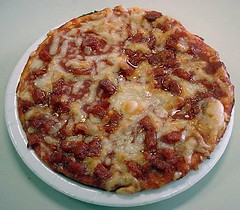 Conventional Oven Instructions: Place baking sheet on center oven rack; preheat oven to 400F. Remove frozen pizza from carton; unwrap. Place frozen pizza on PREHEATED baking sheet. Bake 11 to 13 minutes or until center cheese is melted and crust edge is golden brown. For extra crisp crust: Place frozen pizza directly on center oven rack. Bake as directed.
Conventional Oven Instructions: Place baking sheet on center oven rack; preheat oven to 400F. Remove frozen pizza from carton; unwrap. Place frozen pizza on PREHEATED baking sheet. Bake 11 to 13 minutes or until center cheese is melted and crust edge is golden brown. For extra crisp crust: Place frozen pizza directly on center oven rack. Bake as directed.Result: The cheese was much more evenly melted, without and dehydrated, plasticy areas. The sauce stayed put, bubbling a bit but not pushing its way up through the cheese. Parts of the cheese got golden brown on the surface.
The crust was much nicer on the baked pizza - crispy, but also flaky and tender, with a toasted edge. Although not as agressively crunchy as the microwaved version, it was pleasantly toasted around the edges.
One other thing I noticed: I timed the cooking phase so that each pizza would come out of the oven and be served at the same time. Both of the pies were cooked exactly to package specifications, and yet the microwaved pizza got cold faster than the conventionally-cooked one. I've noticed this in other microwaved foods as well, and it's another reason why I don't use the microwave very often.
Conclusion:
Celeste Pizza For One is still a pretty crappy frozen pizza, even if frozen pizzas themselves have gotten better over the years.
Link:
Pinnacle Food Group, Inc. holds the Celeste frozen pizza brand. The number of other familiar brands they own might surprise you.
20 April, 2009
Revisiting and Revising
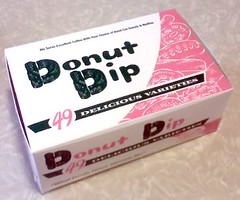 Donut Dip, West Springfield MA (blogged in March 2008:) Happily, Donut Dip is still going strong, baking and serving the best donuts in the Pioneer Valley. When you get tired of factory-made "donuts" shipped frozen from a dunkin' warehouse, make the drive to West Springfield and treat yourself to scratch-made delights baked right there on the premises. Donut Dip coffee is aces, too.
Donut Dip, West Springfield MA (blogged in March 2008:) Happily, Donut Dip is still going strong, baking and serving the best donuts in the Pioneer Valley. When you get tired of factory-made "donuts" shipped frozen from a dunkin' warehouse, make the drive to West Springfield and treat yourself to scratch-made delights baked right there on the premises. Donut Dip coffee is aces, too.18 April, 2009
Sonoma Jacks "Gourmet" Cheese
 The local Big Y supermarket had these cheeses on sale a couple of weeks ago: Sonoma Jacks Gourmet Cheese Wedges. I figured they'd be sort of like flavored versions of those sticky little cheese wedges that Laughing Cow makes. I was kind of right - Sonoma Jacks are sticky little wedges. But while Laughing Cow makes theirs from cheese, powdered milk, milkfat, and cream, Sonoma Jacks are cheese, water, and "natural flavor."
The local Big Y supermarket had these cheeses on sale a couple of weeks ago: Sonoma Jacks Gourmet Cheese Wedges. I figured they'd be sort of like flavored versions of those sticky little cheese wedges that Laughing Cow makes. I was kind of right - Sonoma Jacks are sticky little wedges. But while Laughing Cow makes theirs from cheese, powdered milk, milkfat, and cream, Sonoma Jacks are cheese, water, and "natural flavor."The Pepper Jack variety has a "serving suggestion" on the front label showing a jalapeno-flecked cheese wedge positioned near big slices of pepper. The actual product is so different it's almost deceptive. The pepper bits in the cheese are almost invisible. The "grassy" green flavor of jalapenos is there, but the expected heat or spiciness is almost completely lacking. The texture is wet and sticky, and the overall flavor is quite bland and milky.
But "bland" and "milky" might be the kindest things one can say about the Original variety, which takes the already-mild flavor of Jack cheese to new and untested levels of mediocrity. It's very similar to plain cream cheese - except cream cheese is less expensive, spreads more easily, and doesn't have to be annoyingly unwrapped an ounce at a time.
Interestingly, the Parmesan Peppercorn variety had the most flavor of any of the three, even though there isn't a bit of Parmesan in it - just Jack cheese, "natural flavors" and plenty of coarsely ground peppercorns, which added a fruity, floral kick to the cheese (but unfortunately, not much peppery burn.)
Overall, I didn't find much about this stuff deserving of the label "gourmet." I much prefer a good aged Vermont, Massachusetts, or New York State cheddar, or a real soft-ripened wheel of brie, or a stanky Gorgonzola with a bite so sharp it peels the roof of your mouth. But if you're a fan of sticky cheese spreads and those orange cheese food product "slices" that come in their own individual plastic wraps, you might enjoy the change of pace that Sonoma Jacks will offer.
Link:
Sonoma Cheese Website
17 April, 2009
Capicola - The Final Update!
Today, we took the capicolas down from the attic to the kitchen.
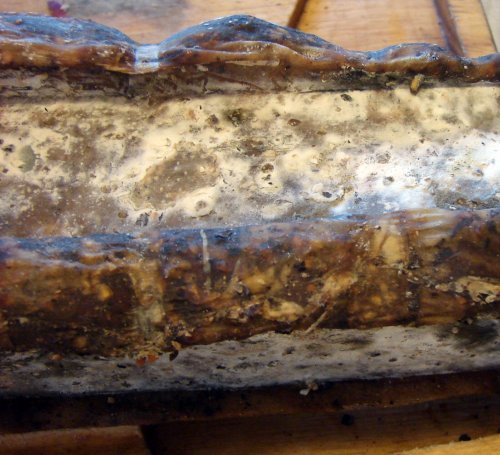 My friend Roger joined me - this has been a shared effort right along - and we started off by cutting the plastic cable ties off of the capicolas, then prying loose the wooden slats. Capicola right out of the splints is an ugly looking thing. The wood hides a bloom of mold which ranges in color from white to blue to green. It's better than harmless - it's actually beneficial and helps develop the flavor of the capicola - but damn, it's hideous.
My friend Roger joined me - this has been a shared effort right along - and we started off by cutting the plastic cable ties off of the capicolas, then prying loose the wooden slats. Capicola right out of the splints is an ugly looking thing. The wood hides a bloom of mold which ranges in color from white to blue to green. It's better than harmless - it's actually beneficial and helps develop the flavor of the capicola - but damn, it's hideous.The next step is removing the casing. This is best done by slipping a knife between the casing and the meat and using the blade to help loosen the casing from the capicola underneath. Once it's loose, it can be peeled off. It will have the stiff feel of rawhide.
Sometimes, when you take the casing off, you'll find more mold underneath. We did, on a few of our cappies. This is caused by trapped air that didn't get sufficiently bled off when we were packing the casings (even though I pricked the casings with a needle as needed, we missed enough of the air that we did get some mold.) Again, this isn't really a problem, as long as the mold is gren, blue, or white (red mold indicates genuinely toxic spoilage.) For the pieces with inside mold, we scrubbed them clean under cool running water.
 Once the capicola were peeled, we gave them another bath in white wine to prepare them for packaging. Using a heavy Chinese chef's knife, we cut each capicola into four more-or-less equal portions and sealed each portion into it's own little cryovac pouch with the vacuum packager.
Once the capicola were peeled, we gave them another bath in white wine to prepare them for packaging. Using a heavy Chinese chef's knife, we cut each capicola into four more-or-less equal portions and sealed each portion into it's own little cryovac pouch with the vacuum packager.It's my experience that, left unopened in the cryovac, the capicola chunks will be safe to eat for about a year, perhaps more. I plan to put most of my packages in the freezer just to be sure.
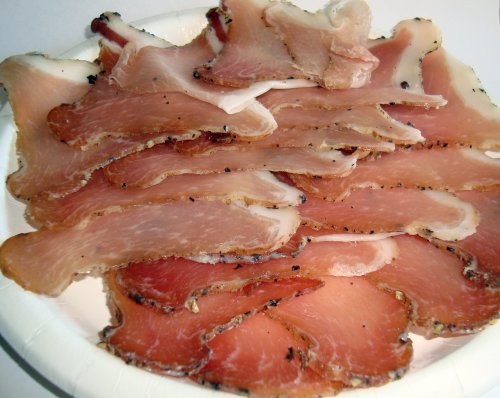 And, of course, we broke out the slicer and slivered one of the chunks so we could enjoy the fruits of our labor and our patience. The meat is a translucent dark rose color, tending to mahogany near the ends of the loins where the diameter was thinner and more moisture evaporated out, and the fat is creamy white and melts in your mouth. The capicola has an earthy, nut-like aroma and a rich, deep meaty flavor. The taste and texture is very similar to a Parma ham.
And, of course, we broke out the slicer and slivered one of the chunks so we could enjoy the fruits of our labor and our patience. The meat is a translucent dark rose color, tending to mahogany near the ends of the loins where the diameter was thinner and more moisture evaporated out, and the fat is creamy white and melts in your mouth. The capicola has an earthy, nut-like aroma and a rich, deep meaty flavor. The taste and texture is very similar to a Parma ham.Success!
16 April, 2009
Tropicana Carton Redesign
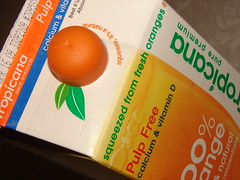 This seems to be a hot time for package redesign. Tropicana Orange Juice cartons are sporting a new, cleaner, more modern design with lots of big, lower-case sans-serif lettering and plenty of wide orange and white spaces.
This seems to be a hot time for package redesign. Tropicana Orange Juice cartons are sporting a new, cleaner, more modern design with lots of big, lower-case sans-serif lettering and plenty of wide orange and white spaces.And check out the cap on the pouring spout - it's a little plastic orange now! Isn't that cute?
15 April, 2009
14 April, 2009
Stop & Shop says Scan It!
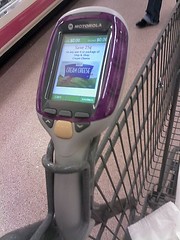 Stop & Shop Supermarkets are offering a new in-store service they're calling Scan It! Users scan their shopping card at the entrance and pick up a hand-held Motorola MC17 scanner. With the scanner in hand, shoppers scan and bag their items as they wander the aisles. When you're done shopping, scan an "I'm finished shopping" barcode at the register, scan your shopping card again, and the MC17 transmits your shopping order to the register, which prints a receipt, asks for payment, and sends you on your way. Any register will accept input from the scanner, so you can pay at the staffed cashier checkout or at the self-service lanes according to your preference.
Stop & Shop Supermarkets are offering a new in-store service they're calling Scan It! Users scan their shopping card at the entrance and pick up a hand-held Motorola MC17 scanner. With the scanner in hand, shoppers scan and bag their items as they wander the aisles. When you're done shopping, scan an "I'm finished shopping" barcode at the register, scan your shopping card again, and the MC17 transmits your shopping order to the register, which prints a receipt, asks for payment, and sends you on your way. Any register will accept input from the scanner, so you can pay at the staffed cashier checkout or at the self-service lanes according to your preference.From my perspective as someone who really likes and is comfortable with technology: This is the cat's ass. As you shop, the big, bright screen gives you a running total (before any taxes) of your grocery order on the top line. You can also scroll through a list of what you've selected and bagged. Change your mind? No problem, just select "Remove," scan the item again, and it's taken off your list. You can also use it to check the price of an unticketed item by scanning the item's barcode. And because your scanner is linked to your shopping card when you activate it, the scanner will also offer you targeted advertising based on your prior shopping patterns - say you buy a lot of dog food, for example. The scanner might make a ka-ching! cash register noise and display a notice of a special discount on your favorite dog food.
But the best part is the time saved when checking out. Since all your items are pre-scanned and bagged, you can glide through the checkout station in seconds. On the Saturday before Easter, my local Stop & Shop was jammed, and lines at the checkouts were huge. But I checked out by going to the empty self-service lane, scanning my card, running my debit card through the pin pad, and walking out the door. I had a full order paid for and loaded in my car before other shoppers had even unloaded their carts for the cashier.
This is aces.
Links:
Stop and Shop Supermarkets
Scan It! at Stop and Shop
Motorola MC17 info from Gizmo Watch
IBM press release to the trade, touting the software they developed for shopping (note the Stop & Shop logo on the scanner screen in the photo.) This is a PDF file.
11 April, 2009
Silk Soymilk Confusion
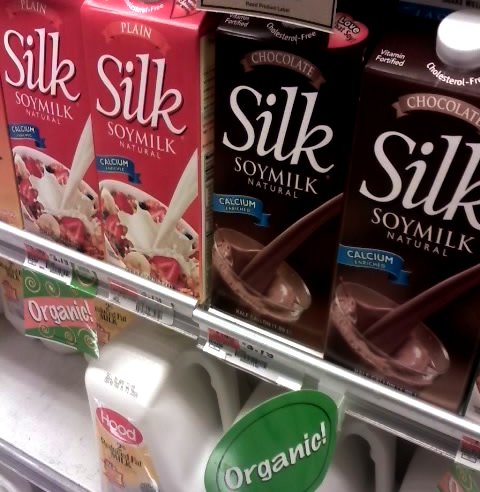 On the 10th, I wrote about Silk Soymilk's label change and how it was causing some confusion. The existing Silk label, which for years has carried a USDA Organic certification, now reads "Silk Soymilk Natural" and the contents are no longer organic. If you want organic Silk, you need to look for the new green cartons which are being sold on adjacent shelves to the natural version.
On the 10th, I wrote about Silk Soymilk's label change and how it was causing some confusion. The existing Silk label, which for years has carried a USDA Organic certification, now reads "Silk Soymilk Natural" and the contents are no longer organic. If you want organic Silk, you need to look for the new green cartons which are being sold on adjacent shelves to the natural version.According to the email I received from WhiteWave, this changeover began back in January. And yet, three months later, some retailers have not changed their shelf labels. Some stores aren't even carrying the new "organic" variety of Silk, but have kept their shelf banners advertising the "natural" variety falsely as "organic" (the photo at right was taken on 11 April 2009 at a local supermarket. They carry Silk Soymilk Natural, but not Silk Soymilk Organic. The signage all identifies Silk as "organic" in this store.) Until retailers get on board with Dean Foods' product shift, there is going to be more confusion - and it won't surprise me if there was some backlash against this kind of borderline-deceptive marketing.
10 April, 2009
New Packaging for Silk Soymilk
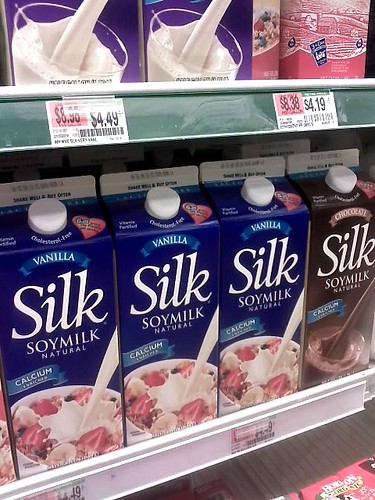 A couple weeks ago, my daughter noticed that Silk soymilk no longer had the "USDA ORGANIC" tag on their label, and she asked me if I had noticed as well.
A couple weeks ago, my daughter noticed that Silk soymilk no longer had the "USDA ORGANIC" tag on their label, and she asked me if I had noticed as well.I hadn't noticed until then, but she was right - the familiar Silk labels were no longer tagged as organic, and the ingredient list had changed as well, describing the ingredients as "natural" rather than "organic."
Because I hadn't seen anything but the original-looking cartons in my regular grocery store, I sent off an email to WhiteWave, asking whether or not Silk was still an organic product, and got this reply:
Thank you for your recent e-mail to Silk®. We appreciate your interest in our products.
Silk is pleased to offer a new line of natural products. As demand for organic and natural food options continue to grow, Silk remains dedicated to providing a variety of selections to satisfy a broad range of consumer demands.
You will find these new products to be the same high quality, great tasting soymilk you have come to know and enjoy.
In addition to the natural lines, Silk will continue to offer the same organic flavors we have always offered – Plain, Vanilla and Unsweetened – in new packaging clearly labeled organic. Silk’s organic product in new packaging will be available starting January 2009. Until then, the organic options for these varieties will still be available.
In addition to offering consumers greater options, broadening our product line gives us an ability to source both natural and organic beans domestically (from North America).
Further, in a time when you have to pay more for every food product, this is an effort to keep our prices in line and competitive. Silk remains committed to providing the highest-quality products to you at competitive prices.
 A few days later, at a different market, I discovered Silk's new packaging for the "organic" product. How clever! The cartons are green! Get it? Green! Organic! You can tell the flavors are different because each different flavor has a distinctively-colored "banner" underneath the big "Organic" script on the front of the carton. That's totally less confusing than making each flavor an entirely different color, right?
A few days later, at a different market, I discovered Silk's new packaging for the "organic" product. How clever! The cartons are green! Get it? Green! Organic! You can tell the flavors are different because each different flavor has a distinctively-colored "banner" underneath the big "Organic" script on the front of the carton. That's totally less confusing than making each flavor an entirely different color, right?I notice that the price is identical for the "natural" and the "organic" varieties, so - for now, at least - WhiteWave isn't trying to differentiate their two varieties based on price points. I wonder about their marketing, though. Why create a new label for an established product, and use a tweaked version of the original label for a new product?
Links:
Silk Soymilk
Silk Soymilk is Not Organic at Healthy Vegan Blog. Blogger Kathy is upset about WhiteWave's marketing changes, which she considers deceptive.
09 April, 2009
Breakfast Sandwich Cage Match: McDonald's vs. 7-11
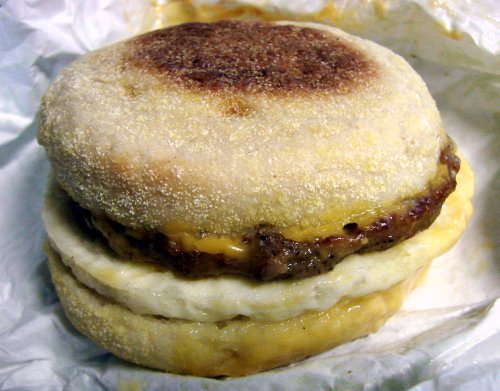
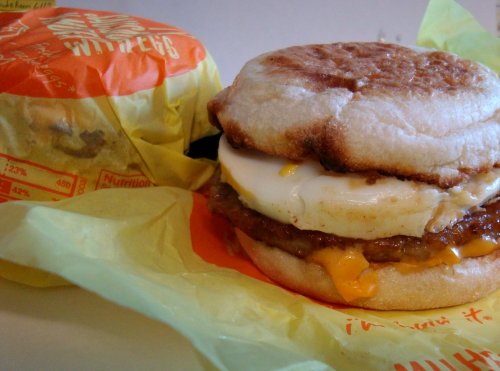
This morning was hectic. I was running late and didn't have the time even for my usual toast, and McDonald's was insanely crowded with long lines both inside and at the drive-through. So I stopped at the much-less-crowded 7-11 a mile down the road instead. 7-11's coffee is aces, and I thought at the very least I could grab a coffee and maybe a bag of popcorn or something to hold me over until lunch.
In the center of the coffee service island, though, there was a warming oven filled with various breakfast sandwiches. Cool, thought I; I wouldn't have to skip breakfast after all. I selected a Fresh To Go Sausage Egg and Cheese on an English Muffin sandwich and was soon on my way to work.
The Comparison:
Freshness: 7-11 is a convenience store, not a restaurant, and they bring their breakfast sandwiches in to be reheated and held at serving temperature until purchased. Because of this, they just can't taste as fresh as a McDonald's McMuffin, which is made to order. So as far as "freshness" goes, I simply accept that 7-11's product starts off with an obvious handicap and take it from there. No points awarded.
English muffin: McDonald's toasts or grills theirs, however minimally. That bit of golden toastiness goes a long way toward flavor, though, and 7-11's muffins still have that "raw" flavor that untoasted muffins exhibit. +1 McD.
Cheese: 7-11's cheese is strange and plasticy, with an artificial taste and a strange slippery texture. Reminds me of Cheese Wiz or Velveeta, neither of which are in my Top One Million Foods list. McDonald's uses straightforward orange Kraft American Cheese produced for them under contract. +1 McD.
Egg: The cooked eggs are the same diameter, cooked to the same degree of doneness, and have the same fresh eggy flavor. The only difference I can see is that the 7-11 egg is thinner. Maybe they're using smaller eggs? +1 McD, +1 7-11 (tie.)
Sausage: McDonald's sausage is a nearly perfect blend of herbs, spice, meaty flavor, and salt. If I could buy it in the store in bulk, I would, because it's just that awesome. 7-11's sausage has a very good texture, not quite as salty as I expected it, and a strong cayenne pepper presence. Spicier than McDonald's, but not as well-balanced a flavor. Thing is, it works in context. Although I wouldn't buy 7-11's sausage for its own sake, it's quite enjoyable on the sandwich. +1 McD, +1 7-11 (a tie.)
The score:
McDonald's Sausage McMuffin with Egg: 4/5
7-11's Fresh To Go Sausage Egg and Cheese on an English Muffin: 2/5
McDonald's wins by a decision.
08 April, 2009
Pomegranate Glazed Pork Chops and More
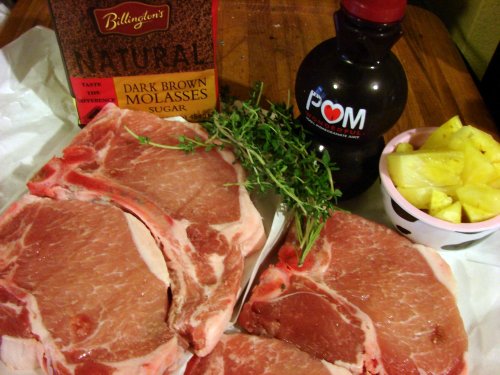 Last night, we had pomegranate-glazed pork chops. We started with six beautiful bone-in pork chops from the neighborhood butcher up the street, and made the glaze from POM pomegranate juice, fresh pineapple, and brown sugar. Fresh thyme and rosemary provided savory notes that complimented the sweet glaze.
Last night, we had pomegranate-glazed pork chops. We started with six beautiful bone-in pork chops from the neighborhood butcher up the street, and made the glaze from POM pomegranate juice, fresh pineapple, and brown sugar. Fresh thyme and rosemary provided savory notes that complimented the sweet glaze.Pomegranate Glazed Pork Chops
Serves 6
1 tablespoon olive oil
1 sprig fresh rosemary (about 4 inches long)
a few sprigs fresh thyme
6 bone-in center cut pork chops, each about 3/4-inch thick
12 ounces POM 100% pure pomegranate juice
¼ cup finely minced fresh pineapple with its juice
3 tablespoons brown sugar
salt and pepper to taste
Heat olive oil in a skillet large enough to hold the chops; sweat the rosemary and thyme in the oil to flavor it, but don't allow the herbs to brown. Pull the herbs to the side of the skillet and add the chops. Brown the chops well on both sides, then remove the chops to a warm platter and pluck the herbs from the pan, discarding them. Pour off excess fat from the pan, but keep a tablespoon or so of the fat in the skillet.Over medium heat, add the pomegranate juice to the pan and deglaze it quickly. Add the pineapple and brown sugar and stir well to blend, simmering all the while. In a few short moments, the sauce in the pan will begin to thicken a bit. Return the chops to the pan and, turning them frequently to cook and coat them evenly, cook gently for about 15 minutes, just until they're done. As the chops cook, the pomegranate sauce in the pan will thicken and glaze the chops. Serve the pork with a drizzle of sauce on the meat, and a small condiment bowl with more glaze on the side.
Side dishes are up to you; we had ours with fried eggplant sticks (one of my daughter's all-time favorite veggie sides.)
Pomegranate Jelly (Small Batch)
Makes about 1 cup
12 ounces POM pomegranate juice
1¼ cup sugar
Combine juice and sugar in a small pan and stir well to completely dissolve the sugar. Over medium heat, bring the mixture to a full rolling boil, then turn heat down to maintain a constant high simmer. Cook, stirring frequently, until the mixture reaches 220 F on a candy thermometer (jelling point) then pour the jelly off into a small Mason jar, cap it, and allow it to cool and set. Store in the refrigerator.
So many fruit flavors are complimentary to pomegranates that I can't wait for early Spring produce to start coming in. I'm looking forward to putting up a batch of strawberry-pomegranate jam, and when the small sugarplums near my house are ready, I'll try combining them with pomegranate as well.
As a final note, I just want to add that pomegranate juice and vodka - on the rocks with a twist - is delicious.
Link:
POM Wonderful's website. Turn your speakers down, they have sound effects.
07 April, 2009
Pistachio Recall Information
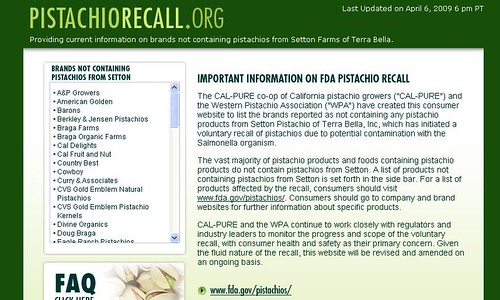 If you're concerned about the recent pistachio recall, you'll want to check out the newly-opened website PistachioRecall.org. The website is a joint effort by the CAL-PURE California pistachio grower's co-op and the Western Pistachio Association, and presents a FAQ about the recall as well as an updated list of pistachio brands and products that are safe to buy and use.
If you're concerned about the recent pistachio recall, you'll want to check out the newly-opened website PistachioRecall.org. The website is a joint effort by the CAL-PURE California pistachio grower's co-op and the Western Pistachio Association, and presents a FAQ about the recall as well as an updated list of pistachio brands and products that are safe to buy and use.The WPA and CAL-PURE have a vested interest in providing consumers with timely information about the recall and about brands which are safe. There's no reason to stop enjoying pistachios as long as we know which ones are OK.
02 April, 2009
Yet Another Internet Scam
Seems kind of suspicious to me. After all, I don't sell anthing here - the only mention I've made of spices have been in recipes and reviews.Do you wholesale? I sent you an email a few weeks ago about selling your spices through our network of stores. They'd be a great fit.
We work with buyers from thousands of grocers, specialty food stores, large chains, mail-order catalog companies and Internet shopping sites. We need a larger variety of spices can choose from, hence my email to you.
If you're interested in selling your spices to more stores visit us at http://www.wiserep.com/
Sincerely,sellers.php We guarantee sales.
David Thibos
Director of Merchandising
WiseRep.com
I decided to find out a little more about WiseRep.com. A quick Google search yields a bunch of hits, but nearly all of them fall into one of these categories:
- Bloggers with items to sell - mostly arts and crafts, but some other items too - who have been contacted by WiseRep with the same kind of email that I got, asking if WiseRep is legit. Funny how the emails are all exactly the same - the only parts that differ are the the words describing a product.
- Press releases announcing that WiseRep has "joined forces with [insert major retailer name here]." That's a pretty clever way of spinning the news that you've signed up for an affiliate program. Your bullshit detectors should ring loudly and clearly at press releases like that - Target, Macy's, Walmart, and other big retailers are household names. Why haven't you ever heard of WiseRep before that suspicious email slipped past your spam filter?
- Blog comments enthusiastically reporting how great WiseRep's services have been and how much sales have grown since Anonymous has signed up with WiseRep. A large number of these comments quote the exact same press release and are so similar that they are obviously copypasta posted by WiseRep shills.
Registrant:
Domains by Proxy, Inc.
DomainsByProxy.com
15111 N. Hayden Rd., Ste 160, PMB 353
Scottsdale, Arizona 85260
United States
Registered through: GoDaddy.com, Inc. (http://www.godaddy.com)
Domain Name: WISEREP.COM
Created on: 17-Oct-06
Expires on: 17-Oct-09
Last Updated on: 06-Mar-09
Administrative Contact:
Private, Registration WISEREP.COM@domainsbyproxy.com
Domains by Proxy, Inc.
DomainsByProxy.com
15111 N. Hayden Rd., Ste 160, PMB 353
Scottsdale, Arizona 85260
United States
(480) 624-2599 Fax -- (480) 624-2598
Technical Contact:
Private, Registration WISEREP.COM@domainsbyproxy.com
Domains by Proxy, Inc.
DomainsByProxy.com
15111 N. Hayden Rd., Ste 160, PMB 353
Scottsdale, Arizona 85260
United States
(480) 624-2599 Fax -- (480) 624-2598
Domain servers in listed order:
AUTH03.NS.HOSTING.COM
AUTH04.NS.HOSTING.COM
Buyer beware.

